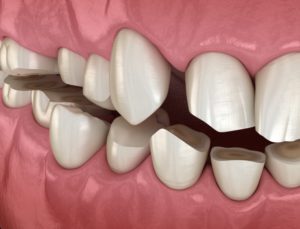
Missing teeth can have a huge impact on your daily life by making it hard to complete basic tasks like chewing food and speaking. Fortunately, tooth replacement options like dental implants are a great way to restore the function, feeling, and structure of your smile for decades at a time. However, if you have oral habits like bruxism that could put your new restorations at-risk, then you’ll want to think over the pros and cons of receiving this advanced treatment. Read on to learn how bruxism impacts dental implants and what you can do to become a good candidate for the procedure.
What is Bruxism?
Bruxism is most commonly known as teeth grinding. It can be caused by a wide array of underlying issues, including bite misalignment, stress, or even missing teeth. Every night when you go to sleep, you may grind and clench your teeth repetitively, causing you to wake up with sore jaw joints or a mild, thumping headache. It can also cause your teeth to wear down and even break or fracture if the force is significant. If you notice that your molars begin to look flatter or any of the other signs of bruxism, it’s important to immediately visit your dentist to help reduce your risk of developing other oral issues down the road.
Can Bruxism Cause Dental Implant Failure?
Just like your natural teeth, dental implants aren’t indestructible. After your implants are placed, you’ll need to undergo an important process called osseointegration, where they’ll fuse with your jawbone and provide your restorations with the strength they require to last a lifetime. While this fusion occurs, you’ll need to make sure that your implants don’t experience excessive pressure caused by teeth grinding, because this could cause the process to fail.
Are You a Candidate for Dental Implants if You Have Bruxism?
If you grind and clench your teeth, you’re at an increased risk of implant failure, and you’ll need to speak with your dentist about how you can keep this from happening after your posts have been placed. One effective preventive treatment they can offer is a nightguard. This is a custom-fitted acrylic mouthguard that you wear overnight to keep your teeth from making contact with each other and sustaining pressure and tension.
At the end of the day, you can grind your teeth and still be a great candidate for dental implants, as long as you follow your dentist’s recommendations on how to prevent dental implant failure. Schedule a consultation to learn ways you can keep your teeth grinding condition from keeping you from restoring your smile.
About the Author
Dr. Dhiren Ahir enjoys putting together completely customized treatment plans for patients to help restore their smiles and improve their oral health. He has over a decade of experience and is passionate about keeping up-to-date with the latest advancements in his field, allowing him to offer a wide array of modern procedures, like dental implants. He is also an active member of several professional organizations, including the American Dental Association, Texas Dental Association, and more. For questions or to schedule an appointment to address the harmful effects of bruxism, visit Prime Dentistry’s website or call 940-514-0333.






